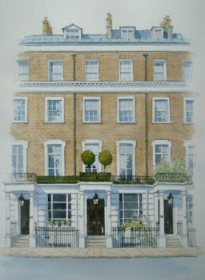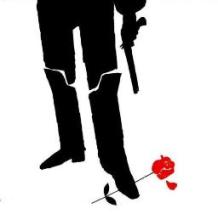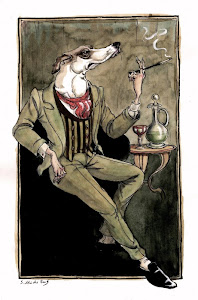 Kirchhorst, 3/3/1948
Kirchhorst, 3/3/1948 "What interested me above all was the relationship of these substances to productivity. It has been my experience, however, that creative achievement requires an alert consciousness, and that it diminishes under the spell of drugs. On the other hand, conceptualization is important, and one gains insights under the influence of drugs that indeed are not possible otherwise. I consider the beautiful essay that Maupassant has written about ether to be such an insight. Moreover, I had the impression that in fever one also discovers new landscapes, new archipelagos, and a new music, that becomes completely distinct when the "customs station" appears. For geographic description, on the other hand, one must be fully conscious. What productivity means to the artist, healing means to the physician. Accordingly, it also may suffice for him that he sometimes enters the regions through the tapestries that our senses have woven. Moreover, I seem to perceive in our time less of a taste for the phantastica than for the energetica—amphetamine, which has even been furnished to fliers and other soldiers by the armies, belongs to this group. Tea is in my opinion a phantasticum, coffee an energeticum—tea therefore possesses a disproportionately higher artistic rank. I notice that coffee disrupts the delicate lattice of light and shadows, the fruitful doubts that emerge during the writing of a sentence. One exceeds his inhibitions. With tea, on the other hand, the thoughts climb genuinely upward."
Ernst Jünger to Albert Hoffman (Private Correspondence)





















4 comments:
A day in the sun, on the beer, watching Australia vs. South Africa in Test Match cricket makes me agree.
You really should pop down some day Coddy.
A great man.
To raise your spirits:
http://www.thelocal.ch/page/view/gay-cameroonian-wins-asylum-in-switzerland
Junger has a very intriguing attitude regarding the mental effects of tea versus coffee: let us not forget that the principal active ingredient in both is caffeine.
Thus we might expect the experiences to be had from drinking either to be similar if not identical. Indeed, Lewin (author of "Phantastica"), categorised both as belonging to the class "Excitantia". Here they accompanied camphor, betel, kat (khat), kola nut, mate, Ilex cassine, cocoa, tobacco, arsenic, mercury, guarana and parica. Five of these are also caffeine-containing.
Obviously, there are other chemicals present in tea leaves and coffee beans and some will not be common to both products. - Perhaps these differences are the cause of Junger experiencing them as belonging to separate pharmacological classes.
It is very odd, however, that Junger classifies tea as a "phantasticum"; a substance belonging to the "phantastica" or "hallucinating substances", as Lewin subtitles them. In this category he places Anhalonium Lewinii (peyotl), cannabis, fly agaric, henbane, Hyoscyamus muticus, thornapple, Datura arborea, Banisteria caapi (actually ayahuasca-potion: DMT plus beta-carbolines, basically), Dubiosa hopwoodii (pituri), Gelsemium semipervirens and the Loco Herbs.
- Had it existed when Lewin wrote, surely he would have placed Hofmann's LSD in this class too.
To put tea and LSD-like substances together is indeed strange for most people, but this is precisely what Junger has done. However, I make no claim at all that he should not have: His personal experience is what has guided him, so maybe he really did find tea mind-expanding.
Two potential explanations spring to mind: i) Junger's physiology may have been unusual, or ii) he could have been experiencing a placebo effect. Unfortunately, I can see no way of determining which.
Regardless, Lewin makes some odd categorisations himself: today most would reckon parica to be a phantasticum or psychedelic, to use a more modern term, and cannabis not to be one. - Or at least not a strong one at normal doses. Cocaine is placed by Lewin into the class "Euphorica" or "Mental Sedatives". Today most would disagree and, if following his categories, would put it in the "excitantia" with other stimulant drugs.
On a final note, it may be sensible to consider how much tea Junger was drinking. With respect to excessive consumption, Lewin mentions the case of "A man who from youth had become accustomed to drinking exaggerated quantities of tea and had reached a daily consumption of 30 cups suffered from symptoms of anaemia, suffocation and hallucinations."
Post a Comment